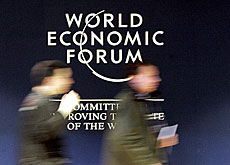WEF and Swiss pledge to tackle common future

The organisers of the 2006 World Economic Forum meeting in Davos and the Swiss authorities have renewed their pledges for a solid partnership.
On the final day of the summit in the Swiss resort of Davos business leaders and top politicians also stressed the need for ethical values.
The president and founder of the WEF, Klaus Schwab, on Sunday reiterated that the annual summit would remain committed to Switzerland.
“Switzerland is one of the best places in the world in terms of quality of infrastructure and services,” Schwab told swissinfo.
He said Switzerland was in a sense the centre of the world, halfway between South-America and Asia.
Schwab underlined that the cooperation on all levels between the WEF and the Swiss authorities was excellent.
“We have set up offices in New York and Beijing and other places, but our nerve centre and the annual summit will remain in Switzerland,” he said.
Essence of dialogue
Swiss President Moritz Leuenberger, who was one of five cabinet ministers attending the Davos meetings, added he knew of nobody who wanted to see the WEF leave the country.
The Swiss people stood behind the meeting of top representatives from the business world and politics, according to Leuenberger.
“The erstwhile gathering of business managers has become an event for politicians, personalities of the arts world and managers.
“Davos represents the very essence of dialogue, because it creates a platform for meetings with its critics,” he said.
Leuenberger said the mountain resort also offered the government a suitable setting to arrange meetings which are otherwise much more difficult to realise.
“The WEF is important for the perception of Switzerland abroad.”
Campaigns
For his part, Economics Minister Joseph Deiss was pleased with this year’s Davos smmit.
He described it as an excellent forum for talks, notably on trade liberalisation, and bilateral relations with Russia and the United States.
He said the venue was a welcome opportunity for Switzerland to play host to such an event.
Several new initiatives were launched over the past five days in the Swiss mountain resort, including campaigns to reduce poverty, improve education and health standards worldwide.
Talking ethics
Discussions focussed on the emergence of China and India, the economic impact of climate change, unemployment, energy and regional conflicts.
Participants showed concern over growing social tensions and unrest in different regions of the world, as well as increasing inequalities as the world population continues to grow.
“If we don’t address these problems now they will spread and bring more populist governments to power,” warned Peter Brabeck-Letmathe, chairman and CEO of the food multinational Nestlé.
For Cardinal Renato Raffaele Martino, Vatican councillor for justice and peace, the Davos meeting showed an urgent need for ethical values.
“It is imperative that these values are applied to all levels of society and forms of organisations,” Cardinal Martino said.
swissinfo, Pierre-François Besson in Davos
The World Economic Forum (WEF), formerly the European Management Symposium in Davos, was founded by Klaus Schwab in 1971.
The annual WEF summit takes place in the Swiss resort of Davos, but in 2002 the meeting was held in New York – the site of the 9/11 attacks four months earlier.
Controversy over the past few years whether the mountain resort is the right venue for WEF meeting has died down.
The 2006 WEF summit attracted about 2,400 participants, including 735 top business leaders, 15 heads of state and prime ministers, as well as stars of the US film industry, such as Angelina Jolie and Michael Douglas.
The slogan of the 36th WEF summit was “Creative imperative”.
Key political and economic themes at the meeting were the emergence of China and India and building trust in leaders and institutions.
Talks also took place on the latest round of trade liberalisations under the auspices of the World Trade Organization.
Five Swiss cabinet members met senior government ministers from the US, Russia and China in Davos.
Microsoft chairman Bill Gates launched a global initiative to eradicate tuberculosis and a RED brand was set up by musician Bono to fund the fight against Aids.

In compliance with the JTI standards
More: SWI swissinfo.ch certified by the Journalism Trust Initiative











You can find an overview of ongoing debates with our journalists here . Please join us!
If you want to start a conversation about a topic raised in this article or want to report factual errors, email us at english@swissinfo.ch.